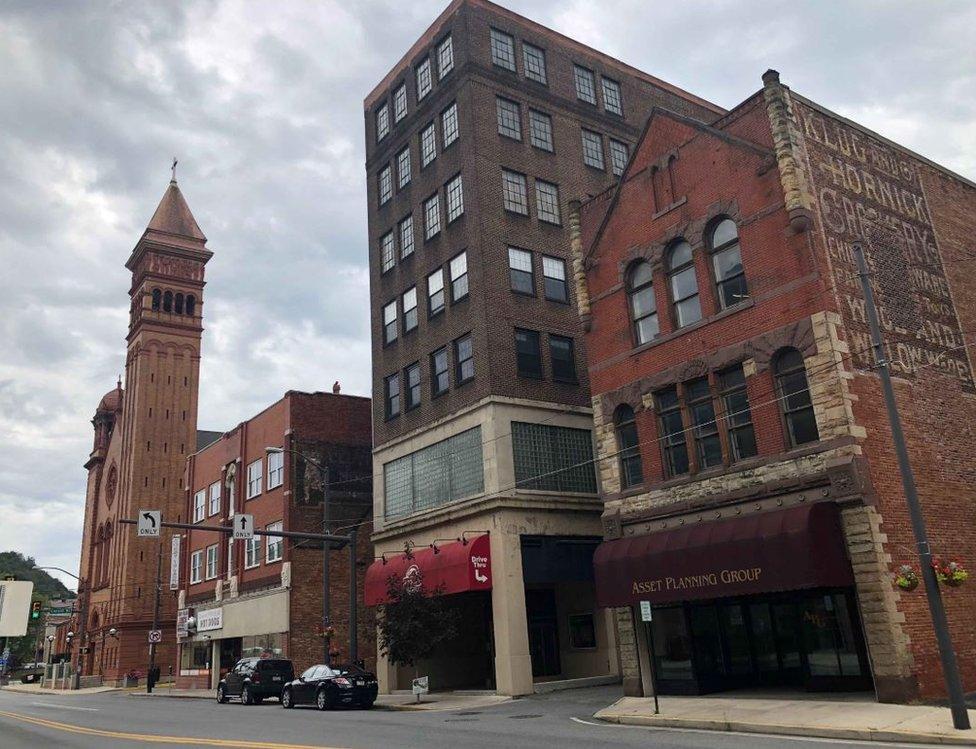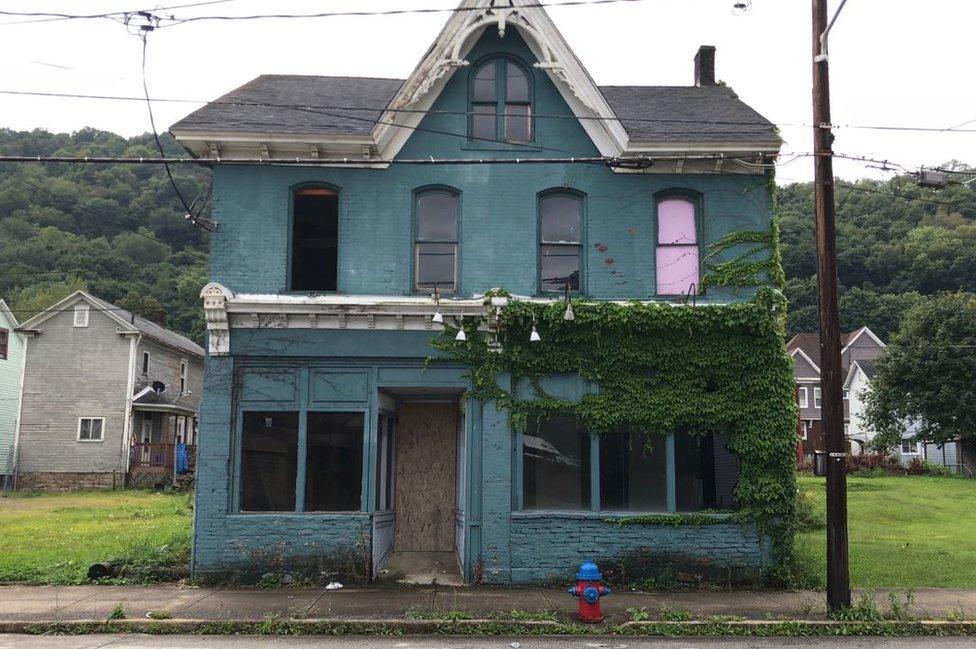Watching impeachment hearing in Trump country
- Published

Lynne Gramling, a businesswoman, does not trust the Democrats who are leading the impeachment inquiry
The television cameras were rolling on the impeachment hearings for the first time this week. It was a big event in Washington but what about in the Trump heartlands?
Many people in the western part of Pennsylvania, a battleground state in the 2020 campaign, were deeply suspicious of the Democratic lawmakers during the first public hearings in the impeachment effort that may remove the US president from office.
These Pennsylvanians strongly defended the president, and their views of Trump and Washington could once again determine the outcome of the election.
Lynn Gramling, a businesswoman, watched the hearing in her living room on Wednesday. When Adam Schiff, the Democratic chairman of the House intelligence committee, spoke, she made a face. "Shifty Schiff", she said, using the president's nickname for the lawmaker.
Schiff and the other Democrats were examining Trump's dealings with the Ukrainian leader during an open hearing in Washington, an historic event that featured senior-level US diplomats. Through the hearing, Schiff and the other Democrats are trying to make a case to the American people that the president has abused his power and should be removed from office.
The Democrats need their support to continue with the impeachment. If they fail to remove the president from office, they will try to vote him out in 2020.
The efforts of Schiff and the other Democratic lawmakers did not go over well with Gramling. Like more than a dozen people in western Pennsylvanian whom I spoke with about the hearing, she expressed admiration for Trump and his term in office and scepticism for Schiff and the way that he handled the hearing.

"Diplomats accuse Trump", reported the Johnstown paper, the Tribune-Democrat, after the hearing
Pennsylvania is a key state in the 2020 campaign. Trump lost the national vote by two points. But he won the presidency because he had the majority of electoral votes, an accomplishment made possible through his victories in Pennsylvania, Michigan and several other states that are rich in electoral votes.
He will need to win Pennsylvania and a number of these electoral-rich states again to stay in the White House, according to a New York Times study, external.
Pennsylvania could go either way. People in the western region are likely to vote for Trump. But people in suburbs dislike him. Plus swing voters - people who have not yet decided whom to support - make up about 15% of the electorate, according to surveys, external.
Learn more about Trump and impeachment inquiry

SIMPLE GUIDE: A basic take on what's going on
GO DEEPER: Here's a 100, 300 and 800-word summary of the story
WHAT'S IMPEACHMENT? A political process to remove a president
THE COMMENTARY: Right-wing media denounce 'boring' hearings
ON THE DOORSTEP: A Democrat sells impeachment to voters
Political operatives are watching closely to see how Gramling and others in western Pennsylvania react to the impeachment inquiry. The hearings offer a window into their thinking and how things are shaking out in one of the most contested states in the nation.
Gramling's hometown, Johnstown, was once a workers' paradise for immigrants from Hungary, Poland and Czechoslovakia. Yet it has suffered the same fate of other US cities that relied on coal and steel. Mills stand empty. Unemployment is nearly double the national average, says George Hayfield, the city manager.
Glosser Brothers, a department store, closed years ago. The place was owned by the family of Stephen Miller, a senior White House advisor, and he spent summers here while growing up.
Key moments from Trump impeachment hearing
Miller came here with Trump for a 2016 rally: "For the rest of your life, you're going to remember this day," Trump said. "The change you've been waiting for will finally arrive."
Big change has not come for Johnstown, but Gramling remains hopeful.
She herself has done well in the Trump years. After selling her building-supply business, she moved into a white-brick house and bought "French salon"-style furniture. The living room is decorated with wall-to-wall carpeting, beige paint and a scented candle ("Winter Wonderland").
Her commitment to the president reflects the lead he commands in this part of Pennsylvania. Here people admire him for his brashness and occasional lack of "couth", as one small-business owner says.
Says Gramling: "I like that he doesn't take any guff from anyone."
A Democrat and a Republican react to the first public impeachment hearing
Her feelings about Schiff are just as strong. Sitting on her couch, she scowled at him on her wide-screen TV. He "cross-questions" the diplomats, she says, telling me that he pushes witnesses so their testimony will "suit his agenda".
With her mistrust of Schiff, she reflects the region's conservative bent. People here, explains Ray Wrabley, a political-science professor at University of Pittsburgh in Johnstown, see the hearings as an attack on the president, "an effort to undo the previous election".
The name of the Pennsylvania county, Cambria, where Johnstown is located is Welsh, and people here once supported Democrats: the county voted for Barack Obama in 2008. But after years of neglect, they turned to Republicans. The county went for Trump by a big margin in 2016.
Still some oppose him, and their disenchantment matters: victory in Pennsylvania can be decided by a few thousand people. "It doesn't take too many votes to swing the state back away from Trump," says Prof Wrabley.
Outside Gramling's house snow lay thickly in the grass. It was near-record cold in western Pennsylvania: 13 degrees Fahrenheit (-10C), the same as on this day in 1911. People in nearby Ligonier huddled over mugs of coffee and club sandwiches at a diner in the evening.
David Johnston, a burly man who works for an electrical supplies store, says the hearing was tainted because Democrats called up the witnesses. For that reason, he says, the proceedings were "skewed", adding: "It's political in nature more than substantive."
Johnston's personal history reflects the region's demographic changes. His father worked in a steel mill and was a Democrat. Johnston is a Trump supporter and sees Democrats as unscrupulous: "From day one the Democratic establishment has tried to destroy his presidency."

Johnstown was once a workers' paradise for Hungarians, Poles and Czechs, but it's fallen on hard times
But some support the Democratic effort. Tammy Fiffick, a Republican, voted for Trump but regrets her decision. An administrative assistant for a synagogue, she is also a billing clerk for lawyers, and she caught up with the hearing while driving to her two jobs.
She says the hearing confirmed what she thought - the president is abusing his power: "They were looking - rightfully so - for something, and this is the one thing they could ding him on."
But most here still cheer him on, and the impeachment inquiry has not changed their minds.
I left Gramling's house as the hearing wound down and called out: "Maybe you'll see something at the end, and you'll say: 'Impeach him.'"
She shook her head. "No," she shouted. "That will never happen." She shut the door.
The loyalty she feels towards the president is deep and could help him score another victory - regardless of any hearing.